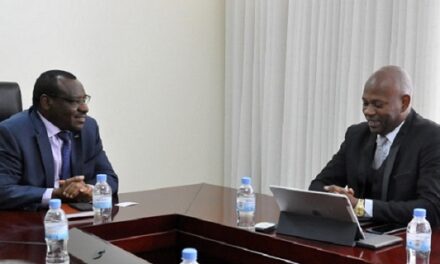
Agriculture contributes over 8% to Namibia’s gross domestic product (GDP), with about 70% of the population dependent on it for income and food security. Agriculture is also the largest employer in the country, accounting for over a fifth of the local workforce.
Despite its economic significance, the agriculture sector received only 4% of the total loans and advances from private banks between 2017 and 2021.
Namibia’s agricultural sector is a cornerstone of the economy, yet it faces a myriad of challenges that threaten its sustainability and growth.
John-James Tromp, Head of Business Banking at Nedbank Namibia, highlighted this discrepancy, noting the disparity in credit allocation to agriculture when compared to its significant contribution to the GDP.
“There is a clear need for increased financial support in this sector, which is a common issue across Africa, where many agricultural small and medium enterprises (SMEs) struggle to access bank loans and are too large for microfinance,” says Tromp.
“This has resulted in a $100 billion gap in unmet financing demand. Bridging this gap is crucial for reviving the agriculture sector and, in turn, ensuring future food security.”
Tromp added that while the bulk of financial assistance to farmers has long come from government-owned entities such as Agribank and the Development Bank of Namibia, private banks also need to do the work to ‘democratise’ credit access to smaller-scale farmers and those in rural areas.
A survey of small and medium farmers in northern Namibia done by Harvard’s Growth Lab, as part of a research project undertaken in collaboration with the government of Namibia from 2020 to 2023, highlighted the challenges faced when it comes to accessing finance.
These included unclear information about formal credit availability and conditions, burdensome and difficult-to-meet requirements, and the insufficient presence of regional officers to understand local needs.
“In response to this pressing need, Nedbank has introduced a new ‘agribanking’ offering by employing a decentralised operating model,” says Tromp.
“Credit managers, equipped with a comprehensive understanding of the Namibian agricultural landscape, aim to visit selected clients to gain deeper insights into their risk environments.”
Loans such as Nedbank’s agribanking solutions are available to individuals, partnerships, companies, close corporations, and trusts.
At Nedbank specifically, these solutions cater to both full-time and part-time farmers who derive more than 50% of their income from sustainable agricultural activities, game farming, land-based environmental preservation, and timber and forestry activities.
“Any financial services company aiming to support agriculture in Namibia must grasp the unique challenges faced by farmers navigating Namibia’s unforgiving landscape,” cautioned Tromp.
As the driest country in sub-Saharan Africa, Namibia encounters severe limitations in agricultural development. Persistent issues such as land degradation and bush encroachment have drastically reduced land fertility and carrying capacity.
Climate disasters like floods and droughts have led to significant losses, particularly in livestock farming.
“Given the unpredictable weather and uncertainty surrounding crop and livestock performance, cash flows for farmers often fluctuate. This underscores the importance for banks to comprehend industry cycles that may impact repayment ability,” says Tromp.
“Our agribanking products are tailored to the seasonal income of businesses, offering flexible capital repayment options, including monthly, quarterly, biannual or annual repayment.”
These financial products include short-term finance, providing working capital through overdrafts that are repayable within one year or a seasonal cycle, asset-based finance for procuring equipment and machinery, and medium-term loans for purchasing equipment, livestock, seed, and other necessary farming inputs.
For property purchases, land acquisition, fixed long-term improvements, and establishing long-term crops, long-term financing vehicles are also available.
“Nedbank’s renewed commitment to Namibia’s agricultural sector aims to align the country with global agricultural trends,” says Tromp.
In the photo: Nedbank Head of Business Banking, John-James Tromp.







